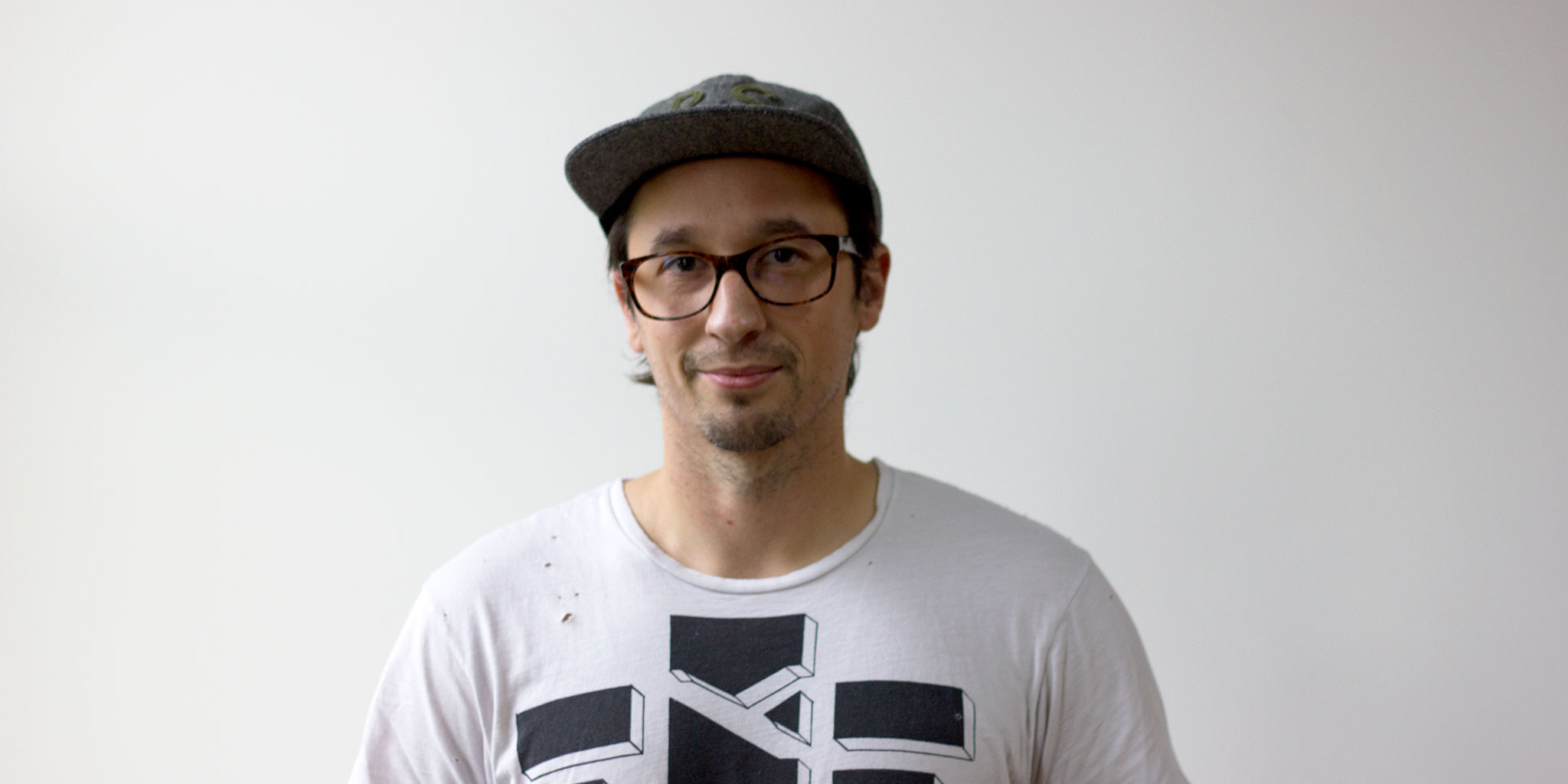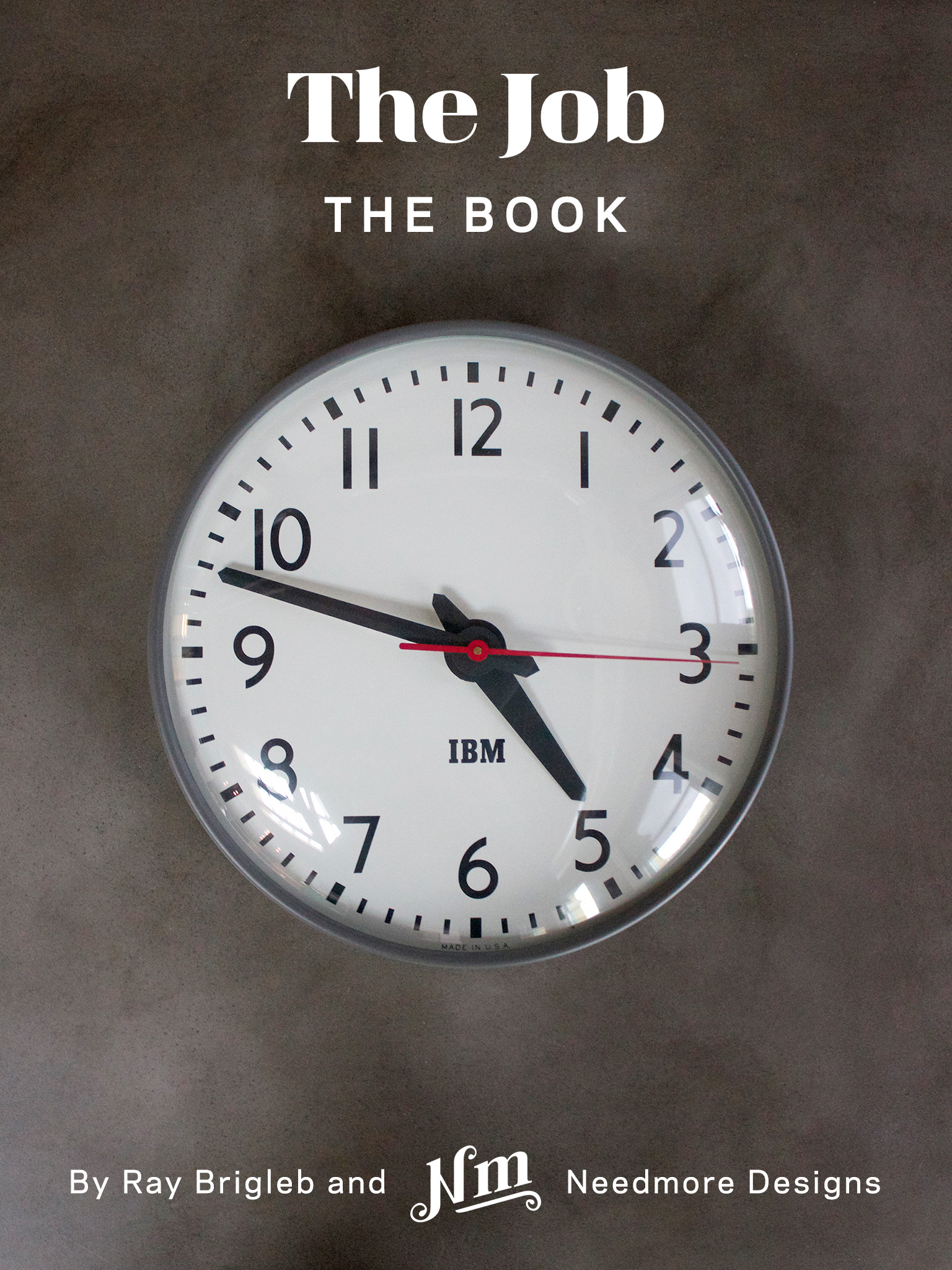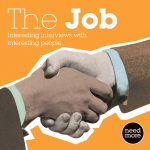
Clayton Cotterell is a fine art and commercial photographer based in Portland Oregon.
- Clayton Cotterell
- Poler Stuff
- Young Fathers
- La Marzocco GS3
- Why Needmore Designs Video
- Woo Commerce Conference
- Prospress interview with Kandace
The Interview
- Ray:
- Clayton thanks for being on the show today. Why don’t you tell me where you’re from and how you got into photography?
- Clayton:
- I’m from the North West; I grew up in Longview Washington. Then I went to college in Seattle and I was there for four years and I was then I went straight to New York City and I was there for six years. Now I’m back in the North West and I’ve been here for just over three years. I just photographed everything when I was in high school. I remember seeing a photograph, there was a window booth thing where people that were taking a class like photo class could post their pictures and pin them up and they are all in like a horrible matte that they made themselves. I would just stare at them forever. I started making photographs in my own time in high school and then just kept going.
- Back in high school were you developing them yourself, were these like black and white…?
- Yeah, it was all black and white, like dark room work. My high school … Longview is not like a booming town at all, but my high school somehow had a computer with Photoshop in the photo room. I actually did something like compositing super early on, which is, I never thought anything of it at the time and now it’s just like I work solely on a computer with my photographs.
- Was there a moment back then where, like when you started doing it was just kind of like you didn’t have any clue, was there a moment where you felt you looked at something you did and you thought it was art, or like worthwhile or successful?
Yeah, there’s actually, it’s weird, there’s one photograph that I shot, it was in color and it was of a building it was just the lines of a building and I knew I shot it in a way that was not typical and I just felt like was something there. I remember I was showing it to my teacher and he would just grade them really haphazardly and he paused on that one for a while and he went, “Hmm” nodded his head and gave it a good one and I was like yeah I knew it. It’s legit.
- Have you since then always found that with photography is it something that you know that when something is successful or does that feedback, is that important part of the process?
- Feedback’s pretty interesting, people always respond to the images almost like it’s the most, least expected ones for me.
- Okay.
- I think when you’re shooting a photograph there’s always that moment that you’re in when you’re making and you’re like, “Oh, this is going to be fucking awesome.” Then later you look at it and you’re like, “It’s not as awesome as I thought.” Or there’s something that you shoot and you don’t think twice about it and then it suddenly goes on something like Instagram and all these people respond to it and you just thought it was some dumb little thing. I don’t know how much I rely on feedback but I’m always interested in what people respond to.
- I’m always interested when, and this sounds weird, but when a photographer embraces Instagram seems really weird to me because Instagram has a reputation “anyone can do it”. When you’re thinking about Instagram, are you trying out ideas there, or are you putting out your finished work on there, how do you use Instagram?
- A little bit of both, yeah.
- Okay.
- I’ll put a finished piece on there and I’d be like, “Hey I made this and I’m stoked on it.” Yeah, I’ll definitely put things that I am curious to see how people react to it. Same with Tumblr, I’ll put a picture on Tumblr and one picture will get re-blogged and go all over the place that I had never expected and others that I’m really happy with don’t; nothing happens.
- Do you ever, when you’re putting stuff on Instagram are you actually shooting like you would normally with a camera and then getting them on there or are you just shooting them with a phone?
- There’s a very little like instant photography happening with my Instagram.
- Okay.
- Some are with my phone, but I’ve definitely shot things with my phone then later I was like, “Fuck I should have used a real camera because that thing is awesome.”
- I was going to … That’s where I was going with that. Do you look back it and go … do you ever actually go back and do the shoot properly?
- Yeah, I’ve done that before.
- Do you ever post those on Instagram just to see if anyone notices?
- No, because I pretty much … If I’m that excited about it I probably posted the original one and then I went back and shot it with my real camera so I could actually make a print.
- Have you done lots of other work or have you pretty much done photography since school?
- For a while I wanted to be a painter, so I think my visual learning all happened at the same time with drawing and painting and sculpture and photography. In high school I pretty much took every art class you could. Then in college my degree was fine arts with an emphasis in photography. I had a year there in college where I thought I was just going to be a painter. I actually didn’t really take any photos; I just focused on drawing and painting. I think all those things influence each other. I originally started taking painting to learn more about how colors work together, which was really beneficial. I think the hard thing for me was having a blank canvas. I think the way I work is really intuitively and I’m really responsive to the things around me, so starting from scratch can be difficult sometimes. Often I think if I do start from scratch with a piece it’s based on something else I’ve already found. Yes, so to answer the question I guess I did everything in the beginning and narrowed it down to photography.
- Do you ever take a break from photography and go back to doing painting or anything like that?
- Not anymore, I’m pretty locked in.
- How do you … I feel like everyone needs to take a break and recharge with something, do you have a outlet that you have?
- Yeah, I rock climb; I’m a rock climber. That’s where I get my aggression out.
- You don’t strike me as aggressive but maybe I haven’t seen you around rocks.
- I crush them.
- Crush the rocks. Let’s talk about present day, tell us about your book.
- Oh yeah, the book is titled Arrangements. That title just came about, it was a working title for the work for a long time then Miles was like, “I like it,” so it just stuck. The book consists of about five years of work. I started making it when I was living in New York and the first photograph I shot for it that started the spark was while I was on a vacation here visiting my parents. We were out on the Oregon Coast and I just shot this photograph of this kind of cliff face, it’s like rock wall face and a shooting film at the time. I went home to New York and scanned it and was working on it and at a certain point I made the decision to change up the way I was working. Before this series I was doing a lot of what I consider composite portraits of these individuals. I did a composite portrait, that Amerpersand actually published a book as well called Unarmed, and it’s a series of my younger brother who is in the US military. I photographed him for I don’t know, maybe four or five years.
- On-duty or off-duty?
- Both.
- Okay.

Clayton’s brother
- Well on-duty in terms of being on base I never … He did two tours in Afghanistan and I never went overseas. I didn’t want to go that way with it. It was more about the domestic side of a young American soldier.
- Okay.
- What I had done is my … That’s why I went to graduate school in New York at school of visual arts and my thesis there was a series called Nouae. Nouae is this kind of like Bohemian skate boarder guy who I met who lives in New Haven, Connecticut or did at the time. He was kind of … He’s basically lived going through the same period of his life like my brother, but in a completely different context and each series is about in between adulthood and a childhood period that everyone goes through. I had been doing that kind of work. It was very like documentary based, 95% of the photographs were candid portraits, but I was also looking for these cinematic moments.
Anyway long story, with Arrangements, I decided I wanted to change everything completely, so Arrangements there was no photographs of people. Before I was little things like I was shooting always horizontal images and in Arrangements they are all vertical. I wanted to stir it up for myself and so that’s when I started making these abstractions that I was finding in the real world. As I was doing that I started to notice this language in contemporary photography where there’s these tabloids people are creating with these colors and geometric shapes and juxtapositions of those things.
I was really interested in that language, but I wasn’t going to create them at a studio so I started to try and find those in the real world, which would allow me to work within that language, but also work in the process I like, that is being out and finding things and responding to what’s around me. That’s how the work started. For a while I was going to paint on the photographs, I was just kind of trying everything because I also wanted to bring that element back in from my past where I used to use my hands on an image. The work evolved through the last five years and in the last couple I started to gel or understood what I was doing then I just cranked out the book.
- When you say that the first one you shot on film, was it all shot on film, mostly digital, did that change?
- Actually when I switched to shooting digitally, it did change a lot because I was able to shoot something and then immediately play with it and figure out what I wanted to do with it. When I was shooting film, I also, I was broke all the time and I would shoot film and then never get it processed because I just didn’t have the cash. Then I didn’t want to get a scan made because, I mean I had a flatbed scanner that scanned like shit and then you’ve got to deal with all the dust and there’s all these things and you’re like, “Oh my Gosh! It’s a labor of love for sure.” I abandoned the film and I got a nice digital camera and haven’t looked back. I sold all my film cameras so I could buy new lenses for my digital.
- Now when you say instant, do you mean you’re shooting like tethered or is this you need to take it back to the studio and play around with it?
- Yeah, I could work on it that day.
- Do you do a lot of post-processing on these like in Arrangements, are you working with those a lot or are they pretty true to what you shot or?
- It varies. Some have a lot of post work done and yes some, it just depends on what the image is. Some have very little and some will have … Like there is an image that has all these branches and there was a lake in the background. People always ask me if I’d messed with it in post, but I didn’t, it’s just the straight image. Then there’s a really blown out branch, this white branch raking across the image and people always ask if I added that in post later or if I messed with it, and that’s just the flash blowing out that branch. That piece that’s actually the cover image for the book and that piece kind of talks about the whole series in a sense that it’s blurring the lines of what’s possible in the image and where the images can be taken, basically. A lot of the photographs in the book, if they do have some kind of manipulation it’s mostly pretty subtle and then some are very apparent some are just like straight up paint into it but, yeah, it’s just like a mix bag.
- Is this, Young fathers is that a series that you did?
- Yeah, those guys are they are a like a hip-hop, RnB trio from Edinburg Scotland and they through town a few months ago. I’ve just been a fan of their music and so I already had tickets to go to the show and it was over at Rotture a really small space. They were coming and I was like, “Man, I would just love to photograph these guys.” I emailed them and they were into it, so my wife and I spent the night with those guys back stage before the show and then I photographed them during the show and after and they were just intrigued.
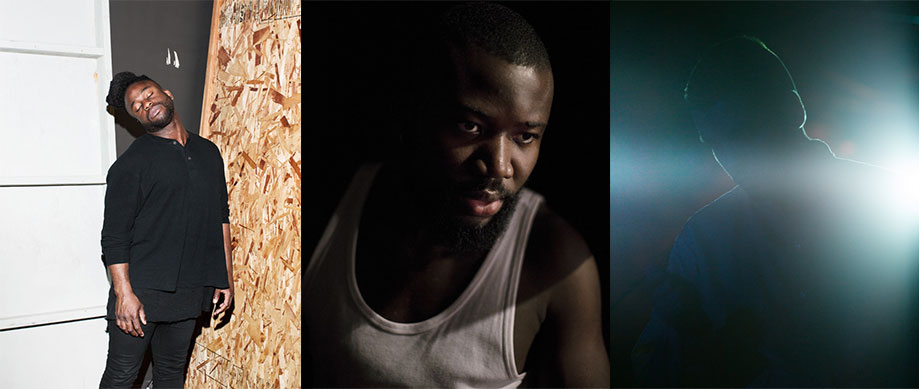
Young Fathers
- That is awesome.
- They’re super talented. Yeah, I definitely recommend them, Young Fathers, really interesting guys.
- Now when I asked earlier about having another job or something, you said you don’t so I assumed that maybe there’s some way that you’re making money out of photography. Do you shoot weddings, or like, what do you do to make money?
- Oh, to make money …
- Not to say that your books don’t make money but I know that …
- Yeah.
- … there might be something else there.
- I do like for my own work, like personal work, I do sell prints every so often through Ampersand, so Ampersand is my gallery of representation, so if somebody wants to buy a print they go through Miles at Ampersand. Just sold three yesterday actually I’m pretty stoked.
- Nice!
- Doesn’t happen every week though, but I also I have been retouching for a long time. I taught photography for a long time. I’m not teaching right now, but I taught in New York and then in Portland altogether for about four years just at community colleges and I taught in the Art Institute here. Then I do shoot commercially and editorially and then it’s basically been pretty much anything that revolves, that involves a photograph I’ve kind of done for money. Except porn, I haven’t done any porn.
- I see you have a picture from Poler here you worked with them on a …
- Yeah.
- Where is this shot? This is like in some sort of canyon or something?
- Yeah, that’s the painted hills.
- Oh, where’s that?
- Where is that?
- Where is that?
- I was like, “Wait that shouldn’t be live here.”
- Oh no, it is sorry.
- That means it’s okay. That’s the painted hills. That’s in Central Oregon. I’ve been shooting with those guys for a few years now and they are awesome. Benjie their creative director, he’s basically if I want to go do something he’s like, “Yeah sounds awesome.” This is for their look book 2014/15 outer wear, which this stuff will launch next week.
- Oh, that’s great.
- Yeah.
- They seem like a … they’re a cool brand I like them.
- Yeah, they’re fun.
- It reminds me of … I talked with the guy who makes the videos for Stumptown and it seemed like it was a labor of love for him too. It’s commercial work but he has a lot of license to shoot two brides or whatever it is.
- Yeah.
- Then there is some … I wanted to ask you about these photos that are in here very recently so I have to show you upside down, but what are these, they are very stark black and white, it looks like skate boarders?
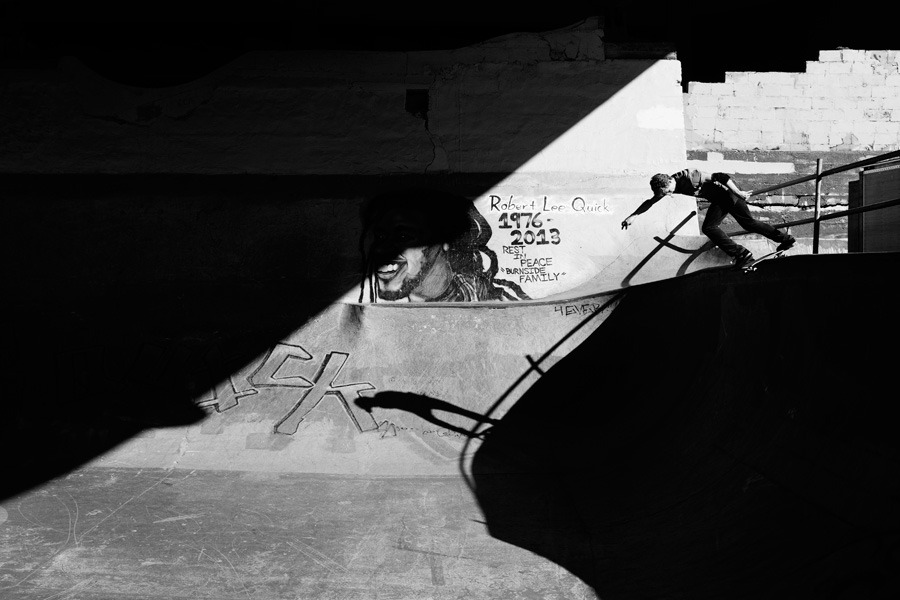
Burnside Skate Park
- Yeah, those were shot at Burnside Skate Park, which I get kicked out every time.
- Yeah, sure. How do you get the … Did you just crop them out?
- Yeah, so I’ve been retouching …
- I was going to say it is not that clean over there I’ve been over there.
- I’ve been retouching for commercial work for a few years and so I basically have ultimate control over the image digitally like I can do pretty much I what I want with it. With those I’ve been doing this thing that I enjoy where have an image I just shot out in the real world and I like to pluck it out of that and put it in this stark space, where you can’t tell if it’s a studio or a gigantic studio or … You can’t always tell what’s going on. It becomes graphic in nature too because of that starkness but those are just like tests. I’ve just been playing around.
- I also noticed you’ve done work for … I was going to ask about this … Esquire Russia?
- Oh, yeah.
- How does that come about?
- That was just awesome, they just…
- First of all Russia has an Esquire?
- Yeah, it’s like
- I did not know that.
- … it’s like the coolest one.
- Is it cooler than ours?
- It is and they’ll tell you that. Yeah that was cool it was, I shot the innovation lab out at Nike. It was kind of an arboretorial thing. I was contacted by Nike Russia and they asked me to do the shoot. It was a Sunday during the day I got email asking me to shoot on the next Tuesday so I was like, “Yeah, of course.” They all flew out the day before and were crazy jetlagged and they were like, “Basically just go in here and make the weirdest, coolest pictures you can.” I was like, “Okay.” It was all based on the work from Arrangements so it was awesome. I had a very little brief and just ran around with my camera and a flash and spent like a day shooting there. It was fun.
- That is cool. Do you have … You’ve actually worked with a lot of cool people. Do you have a dream client who you think someday you would, like the President or something is there someone you would love to shoot or someone you would love to work with?
- Just me and Obama in a room.
- That’s right.
- I don’t know I mean …
- For Esquire Russia.
- No, I don’t know. I feel like I’m still, compared to a lot of people, I haven’t done much, I feel like so I am pretty open to everything. I’ve been wanting to do more kind of like fashiony work. This latest look book for Polo is we wanted it to look … Everything that Poler is in has been very kind of like from the hip 35 millimeter film kind of loose and we wanted this look book to look a little more like it could be in Vogue or something like that so it’s a lot more fashiony. I just like doing stuff like that because it’s just beautiful. You are just taking a person, in a beautiful setting and making a beautiful photograph with the lights just right and all these things and that’s a huge joy. I’ve been enjoying, I want to do more of that. More fashiony on model type stuff. Yeah, I don’t know, I’m kind of for whatever.
- Do you use light room?
- I do.
- Just curious.
- I hear capture one is a shit.
- Capture one, what’s that?
- That’s if you are shooting tethered. It’s a lot faster.
- Do you do a lot of work shooting tethered like if you are in a studio?
- Yeah, if I’m shooting in the studio I’m pretty much shooting tethered.
- How much of your commercial work is shooting in the studio versus just running around with a flash kind of thing?
- I guess half-and-half.
- Okay.
- I’ll shoot, I don’t necessarily show everything on my site that I do but I’ll shoot shoes and stuff; it’s Portland.
- Yeah. How long ago did you finish working on Arrangements, the book?
- The book itself I just launched. I was pretty much shooting for it up until we send files off to the printer.

Arrangements
- Okay, so very recent.
- Yeah, and I feel like I’ll keep adding to it. I’m not totally sure what’s going to happen. I feel like …
- Adding to it like, send a page to everyone who bought it just in the middle?
- Yeah totally.
- Little sticker.
- Yeah. No, just in the sense the book is complete but I’m not going to stop making photographs like that so like if …
- It’s kind of an ongoing project then in a sense.
- Yeah, I kind of consider … The way I work it’s really organic and I’m always trying to evolve as a photographer and an image maker, so I can’t be like, “I’m done.” What I’ve been doing recently is I’ve been shooting in a very similar style, but with a different camera and I’ve been making them all black and white and putting a flattened tone. Excuse me, I spurt. The idea with those is I want to print them on different papers like newsprint and play with the way that those images can read, see if there are any threads with the Arrangements.
- I shouldn’t have eaten this nut. I was trying to cover for you.
- It’s okay.
- Like why did I put the nut in my mouth? It just occurred to me. Have you ever done any video work?
- Very little. I did a short little film in grad school that was probably pretty terrible.
- Having finished with Arrangements, do you have another personal project in mind after that that’s just keeping down that track or are you thinking maybe there is a next book in you or something like that?
- Yeah, I’m always thinking about books for sure. I like the idea of having a series in your hand once it’s finished. The next project I’m doing is right now it’s just leaching of what I just talked about with this black and white thing. I’m doing a show in June or July in Milwaukee with a couple other Portland photographers. Chris Benet organized it and Cory Arnold and Holy Andreas and Sean Records, Melanie Floyd and a couple other people. For that show I’m thinking I want to do these big black and white newsprint prints paired with images from Arrangements or some with images like that from Arrangements. We’ll see how that goes. Not very size and things like that but I don’t know what I’m doing. I’m just going with the flow.
- When you said paradise my first thought before you finished your sentence was, “Paired with a nice wine, like if you are walking around with the show you go little sip of this to go with a piece of art.”
- It’s pretty much like that.
- That’s what’s next in Portland and art shows with food and wine.
- Wine and art.
- Food and wine terraces as you walk around. Cool. Thank you Clayton so much for chatting with me today.
- Thank you.
- Cool.
All Photos Credit Clayton Cotterell
